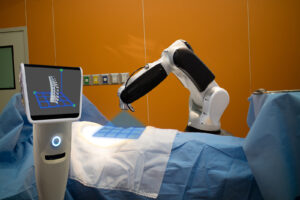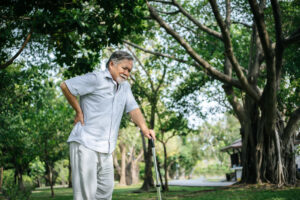As we age, our bodies undergo various changes that can impact our overall health and well-being, including the development of herniated discs. Herniated discs can be incredibly painful and debilitating, significantly impacting our quality of life. I find it important to educate my patients on understanding the link between aging and herniated discs, and and how to help manage them.
What Are Herniated Discs?
The spine is made up of a series of bones called vertebrae that are separated by small, spongy discs. These discs act as cushions between the vertebrae and help to absorb shock and pressure. However, as we age, these discs can start to deteriorate, causing them to become less flexible and more prone to damage.
A herniated disc occurs when the soft, jelly-like center of a spinal disc pushes through a crack in the outer layer. This can cause inflammation and compression of the nearby nerves, resulting in back pain, numbness, and tingling. Herniated discs can occur in any part of the spine, but they are most common in the lower back (lumbar spine) and the neck (cervical spine).
The Link Between Aging and Herniated Discs
Herniated discs are more common in older adults. This is because the discs in our spine naturally degenerate over time, which can make them more susceptible to damage. In addition to age-related degeneration, other factors that can contribute to herniated discs include genetics, repetitive motions, obesity, and smoking.

Managing Back Pain as You Age
Exercise
Exercise is one of the most effective ways to manage back pain. Exercise helps to strengthen the muscles that support the back, which reduces the risk of injury. Low-impact exercises like walking, swimming, and cycling are excellent options for people with back pain. Yoga and pilates are also great options as they help to improve flexibility, balance, and strength.
Maintain Proper Posture
Maintaining proper posture is also crucial in managing back pain. Poor posture is one of the links between aging and herniated discs. Slouching or sitting hunched over a desk for extended periods can cause strain on the back muscles and lead to pain. To maintain proper posture, ensure that your feet are flat on the ground, your shoulders are relaxed, and your spine is straight. When sitting, use a chair with good back support, and take regular breaks to stretch and move around.
Weight Management
Weight management is another important factor in managing back pain. Excess weight puts strain on the back muscles and can cause pain. Losing weight through a healthy diet and exercise can reduce the strain on the back muscles and help alleviate pain.
Heat and Cold Therapy
Heat and cold therapy can also help reduce pain and inflammation caused by back pain. Applying a heating pad or taking a warm bath can help relax tense muscles and improve blood flow to the affected area. Applying a cold pack or ice can help reduce inflammation and numb the pain.
Medication
Over-the-counter pain relievers like ibuprofen or acetaminophen can also help relieve back pain. Remember that these medications can provide temporary relief, but they don’t address the underlying cause of the herniated disc. Taken over a long period of time, side effects such as liver damage, ulcers, and kidney problems could develop.
Surgery
In severe cases, surgery may be necessary to manage back pain. Surgery is usually recommended for people with underlying medical conditions like spinal stenosis, herniated discs, or spinal fractures. However, surgery should only be considered after all other treatment options have been exhausted.
When to Seek Medical Care
If your back pain is severe, or if it lasts for more than a few days, it’s essential to seek medical care. Additionally, if you experience any of the following symptoms, seek medical care immediately: numbness or weakness in your legs, loss of bowel or bladder control, fever or chills, or unexplained weight loss. These symptoms could indicate a more serious underlying condition that requires immediate medical attention.

Back Pain Solutions at The Institute for Comprehensive Spine Care
My team and I are dedicated to providing expert care and support and have extensive experience with herniated discs. As a highly accredited medical professional with over 20 years of experience in treating spinal conditions, I am committed to educating my patients about the link between aging and herniated discs, and providing personalized treatment plans that reduce pain, increase mobility, and improve their overall quality of life.
We strongly believe in the benefits of preventive care and minimally invasive surgeries, and we prioritize clear communication and personalized attention for each of our patients. Our goal is to work with our patients to develop a comprehensive treatment plan that addresses their specific needs and goals.
If you’re experiencing spinal issues that are causing a decrease in your quality of life, I encourage you to contact us to schedule a consultation today. With our personalized approach to care and commitment to patient education, we believe that we can provide you with the best possible care for your spinal condition and help you live life to the fullest.








